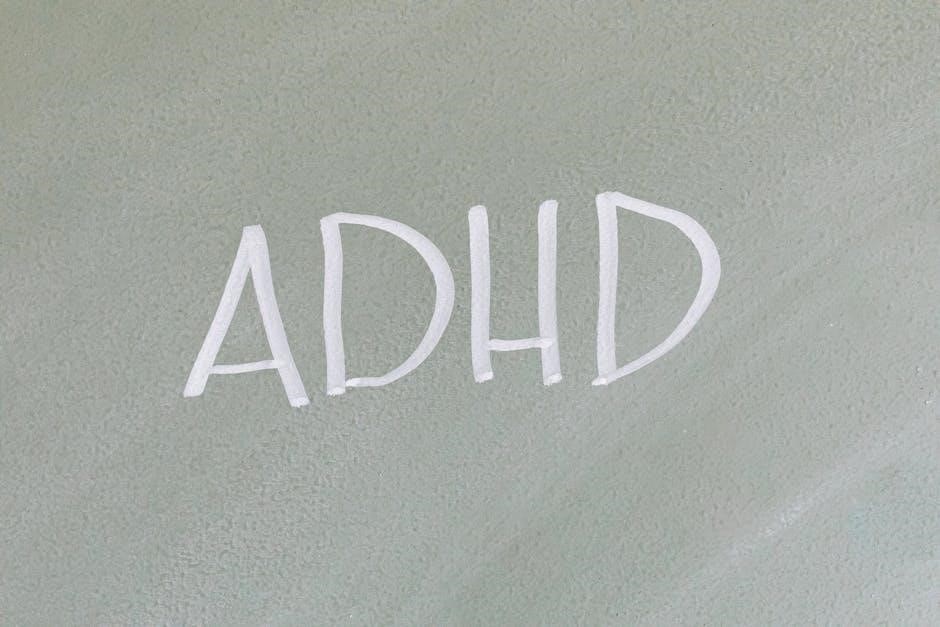Understanding ADHD is crucial for therapists to manage symptoms effectively. Therapists play a key role in implementing evidence-based interventions‚ including behavioral‚ cognitive‚ and educational strategies‚ to support individuals with ADHD.
1.1 Overview of ADHD and Its Impact on Individuals and Families
ADHD is a neurodevelopmental disorder characterized by symptoms of inattention‚ hyperactivity‚ and impulsivity. It significantly impacts daily functioning‚ relationships‚ and overall well-being. Families often experience increased stress‚ disrupted dynamics‚ and challenges in supporting their loved ones. Understanding the condition’s effects is essential for developing compassionate and effective therapeutic strategies to address both individual and familial needs.
1.2 The Role of Therapists in ADHD Management
Therapists play a crucial role in ADHD management by providing evidence-based interventions‚ education‚ and support. They help individuals and families understand ADHD‚ develop coping strategies‚ and improve daily functioning. Therapists also guide behavioral and cognitive changes‚ fostering a supportive environment for long-term growth and adaptation‚ while addressing the unique needs of each client.
Behavioral Interventions for ADHD
Behavioral interventions focus on modifying actions and environments to reduce ADHD symptoms. Techniques like positive reinforcement and clear boundaries help improve focus‚ reduce impulsivity‚ and enhance overall behavior.
2.1 Behavioral Therapy Techniques for Children and Adolescents
Behavioral therapy for children and adolescents with ADHD often involves positive reinforcement‚ token economies‚ and structured routines. These techniques help reduce impulsivity and improve focus by rewarding desired behaviors. Therapists also teach parents and educators to create consistent environments‚ promoting better emotional regulation and academic performance in young individuals with ADHD.
2.2 Positive Reinforcement Strategies to Improve Focus and Behavior
Positive reinforcement is a key strategy in managing ADHD symptoms. Techniques like praise‚ stickers‚ or small rewards encourage desired behaviors. Token systems and clear expectations help improve focus and reduce impulsivity. Consistent use of these strategies creates a structured environment‚ fostering better self-regulation and behavior in individuals with ADHD.
Cognitive-Behavioral Therapy (CBT) for ADHD
Cognitive-behavioral therapy (CBT) is an evidence-based approach to managing ADHD. It focuses on identifying and changing negative thought patterns and behaviors‚ helping individuals improve focus‚ organization‚ and self-regulation.
3.1 Cognitive Restructuring Techniques for Adults with ADHD
Cognitive restructuring helps adults with ADHD identify and challenge negative thought patterns. Techniques include recognizing unhelpful beliefs‚ reframing perspectives‚ and practicing self-monitoring. These strategies enhance self-regulation‚ reduce impulsivity‚ and improve daily functioning‚ fostering a more balanced and productive lifestyle.
3.2 Practical Strategies to Enhance Executive Functioning
Therapists can help adults with ADHD improve executive functioning through practical strategies like creating external reminders‚ breaking tasks into smaller steps‚ and using visual schedules. Tools such as task prioritization lists and time management apps can enhance organization and reduce procrastination‚ fostering greater independence and productivity in daily life.
Pharmacological Interventions and Their Role in Therapy
Pharmacological interventions‚ such as stimulants and non-stimulants‚ play a crucial role in managing ADHD symptoms. Therapists must monitor medication adherence and side effects to optimize therapeutic outcomes.
4.1 Overview of Common ADHD Medications and Their Effects
Common ADHD medications include stimulants like Ritalin and Adderall‚ which enhance focus and reduce impulsivity. Non-stimulants‚ such as Strattera‚ also improve attention and behavior. These medications help manage symptoms but must be carefully monitored for side effects like sleep disturbances or appetite changes. Therapists should work closely with prescribers to tailor treatment plans and ensure adherence‚ balancing benefits and potential drawbacks for optimal outcomes.
4.2 Monitoring Medication Adherence and Side Effects in Therapy
Therapists must actively monitor medication adherence and side effects‚ such as sleep disturbances or appetite changes. Regular check-ins help assess treatment effectiveness and identify potential issues. Collaborating with prescribers ensures adjustments are made promptly‚ promoting better symptom management and minimizing adverse effects. Open communication with patients and families is key to maintaining trust and optimizing outcomes in ADHD therapy.

Educational and School-Based Interventions
Educational interventions focus on creating supportive learning environments for students with ADHD. Strategies include accommodations‚ behavioral support‚ and collaboration between educators and therapists to enhance academic and social success.
5.1 Classroom Strategies for Managing ADHD Symptoms
Classroom strategies for managing ADHD include creating structured environments‚ using visual reminders‚ breaking tasks into steps‚ and implementing positive reinforcement. Teachers can also use movement breaks and preferential seating to help students focus. Collaborating with therapists ensures consistency in support‚ fostering academic and behavioral success for students with ADHD.
5.2 Collaborating with Teachers and Parents for Consistent Support
Collaboration between therapists‚ teachers‚ and parents ensures consistent support for individuals with ADHD. Regular communication and shared goal-setting help align strategies across home and school. Therapists can provide resources like behavior charts or assignments to reinforce Positive reinforcement techniques‚ while parents and teachers can offer insights into daily challenges and progress.

Social Skills Training for ADHD
Social Skills Training helps individuals with ADHD improve communication and peer relationships through structured techniques like role-playing and group activities‚ enhancing interaction and reducing impulsivity.
6.1 Techniques to Improve Communication and Peer Relationships
Therapists use role-playing‚ social stories‚ and emotional regulation exercises to enhance communication skills in individuals with ADHD. These techniques foster better peer interactions and reduce social challenges‚ promoting meaningful relationships.
6.2 Group Therapy Approaches for Social Skills Development
Group therapy provides a structured environment for individuals with ADHD to practice social interactions. Activities like problem-solving tasks and collaborative games encourage teamwork‚ empathy‚ and conflict resolution‚ fostering improved social functioning and peer connections.
Mindfulness-Based Interventions for ADHD
Mindfulness-based interventions offer a powerful tool for managing ADHD symptoms‚ reducing impulsivity‚ and improving focus. These practices enhance emotional regulation and reduce stress‚ fostering overall well-being.
7.1 Mindfulness Practices to Reduce Impulsivity and Improve Focus
Mindfulness practices‚ such as meditation and breathing exercises‚ help individuals with ADHD reduce impulsivity and enhance focus. Regular mindfulness sessions improve attention and emotional regulation‚ fostering better self-control and concentration. These techniques can be incorporated into daily routines‚ providing a non-invasive‚ effective approach to managing ADHD symptoms and improving overall mental clarity and stability.
7.2 Incorporating Mindfulness into Therapeutic Sessions
Therapists can integrate mindfulness into sessions through guided exercises‚ breathing techniques‚ and mindful movement. These practices enhance emotional regulation‚ self-awareness‚ and focus. Regular mindfulness exercises help clients develop greater self-control and reduce impulsivity‚ creating a calm and centered environment for effective therapy. This approach complements other interventions‚ fostering holistic growth and long-term symptom management for individuals with ADHD.

Neurocognitive Interventions and Brain-Based Strategies
Neurocognitive interventions‚ such as neurofeedback and cognitive training‚ target brain function to improve attention and reduce impulsivity‚ offering tailored strategies to manage ADHD symptoms effectively.
8.1 Neurofeedback Training for ADHD Symptom Management
Neurofeedback training is a brain-based intervention that helps individuals with ADHD monitor and regulate their brain activity. By providing real-time feedback‚ it targets attention and impulse control‚ improving focus and self-regulation. Studies‚ such as von C OConnor’s 2022 research‚ highlight its effectiveness in reducing symptoms and enhancing cognitive functioning‚ offering a promising adjunct to traditional therapies.
8.2 Cognitive Training Programs to Enhance Attention and Memory
Cognitive training programs are designed to improve attention‚ memory‚ and executive functioning in individuals with ADHD. These structured activities‚ such as memory games and attention exercises‚ strengthen neural pathways‚ enhancing focus and recall. They are often integrated into comprehensive treatment plans‚ complementing other therapies and lifestyle adjustments to boost academic‚ work‚ and daily functioning‚ ultimately improving quality of life for those with ADHD.
Case Studies and Success Stories in ADHD Therapy
Case studies highlight effective ADHD interventions‚ showcasing improvements in children and adults. Success stories demonstrate long-term benefits‚ offering insights into tailored therapeutic approaches and positive outcomes.
9.1 Examples of Effective Intervention Outcomes in Children
Behavioral therapy and positive reinforcement strategies have shown significant success in improving focus and reducing impulsivity in children with ADHD. Case studies highlight enhanced academic performance‚ better emotional regulation‚ and stronger peer relationships. Collaborative efforts between therapists‚ teachers‚ and parents often lead to consistent‚ positive outcomes‚ demonstrating the effectiveness of tailored interventions in childhood ADHD management.
9.2 Adult ADHD Case Studies Highlighting Long-Term Benefits
Adult ADHD case studies demonstrate the long-term effectiveness of interventions like cognitive-behavioral therapy (CBT) and executive functioning strategies. These approaches often lead to sustained improvements in work performance‚ relationship management‚ and emotional regulation. Over time‚ adults with ADHD report enhanced self-awareness‚ reduced impulsivity‚ and better overall quality of life‚ showcasing the enduring benefits of tailored therapeutic interventions.

Cultural and Individual Considerations in ADHD Therapy
Cultural differences and individual needs significantly influence ADHD therapy. Therapists must tailor interventions to accommodate diverse backgrounds‚ beliefs‚ and personal circumstances‚ ensuring effective and respectful treatment approaches.
10.1 Addressing Cultural Differences in ADHD Diagnosis and Treatment
Cultural differences significantly impact ADHD diagnosis and treatment. Therapists must recognize how varying perceptions of symptoms and behaviors across cultures influence diagnostic approaches and intervention effectiveness.
Cultural competence is essential to ensure accurate assessments and tailored treatments‚ avoiding misdiagnosis and improving outcomes for diverse populations.
10.2 Personalized Approaches to Meet Diverse Client Needs
Therapists must adopt personalized strategies to address the unique needs of each client with ADHD. Tailored interventions consider individual circumstances‚ preferences‚ and cultural backgrounds‚ ensuring effective and meaningful support. By adapting techniques to fit diverse requirements‚ therapists can foster better engagement and outcomes‚ promoting long-term success for clients with varied challenges and goals.
Effective ADHD interventions combine evidence-based strategies with emerging trends. Future research should focus on personalized approaches‚ neurocognitive advancements‚ and cultural adaptability to enhance therapeutic outcomes.
11.1 Summarizing Key Interventions and Their Effectiveness
Key ADHD interventions include behavioral therapy‚ cognitive-behavioral therapy‚ medication‚ and educational strategies. These approaches have shown significant effectiveness in managing symptoms‚ improving focus‚ and enhancing daily functioning. Behavioral interventions‚ particularly positive reinforcement‚ are highly effective in children‚ while CBT and mindfulness-based practices benefit adults. Combining these interventions often leads to better outcomes‚ emphasizing the importance of a multi-faceted approach.
11.2 Emerging Trends and Research in ADHD Therapy
Emerging trends in ADHD therapy include advancements in neurocognitive strategies‚ mindfulness-based interventions‚ and personalized treatment plans. Research highlights the importance of cultural adaptations and technology integration‚ such as AI-driven tools for monitoring symptoms. Additionally‚ studies are exploring the role of neuroimaging to better understand ADHD’s neurological basis‚ paving the way for more targeted and effective interventions.

No Responses